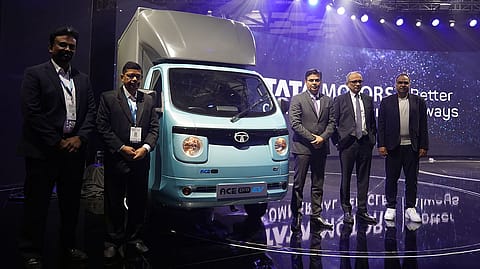Tata Motors rolls out factory-fitted AC cabins across its entire truck line-up ahead of the mandate
India’s largest commercial vehicle maker now offers air-conditioned cabins and cowls across SFC, LPT, Ultra, Signa, and Prima ranges—aimed at boosting driver comfort, fleet productivity, and regulatory compliance.

Tata Motors, India’s largest maker of commercial vehicles, has announced the rollout of factory-fitted air conditioning (AC) systems across its entire range of trucks—including, for the first time, on cowl models—lorries without factory-fitted cabins, which are fabricated at unorganised bodybuilding workshops. The upgrade spans all major platforms—SFC, LPT, Ultra, Signa, and Prima. In fact, the trucks are now designed to enhance driver comfort, reduce fatigue, and elevate overall fleet productivity.
This strategic enhancement comes ahead of the June 2025 deadline for the mandatory implementation of air-conditioned driver cabins on all commercial trucks, as directed by Indian transport safety norms. Tata Motors has taken the opportunity not just to comply, but to differentiate itself through performance-centric innovations.
“The introduction of air-conditioned cabins and cowls marks a significant step towards building a comfortable working environment for drivers, enabling higher productivity,” said Rajesh Kaul, Vice President and Business Head, Trucks, Tata Motors Commercial Vehicles. “These upgrades, shaped by customer feedback and smart engineering, are designed to minimise total cost of ownership and deliver long-term value.
”Beyond just cooling comfort, Tata Motors’ new AC systems include dual-mode operation—Eco and Heavy—to ensure energy-efficient climate control. The company has also bumped up power output across heavy-duty trucks, tippers, and prime movers to as much as 320 hp, helping tackle demanding terrains and long-haul applications.
Other tech-led upgrades include engine idle auto-shut, real-time voice alerts, and duty-cycle-based fuel efficiency enhancements.
In December 2023, the Ministry of Road Transport and Highways (MoRTH) had notified through a gazette that, “...the vehicles manufactured on or after October 1, 2025, shall be fitted with an air-conditioning system for the cabin of vehicles of N2 and N3 category.” This was after Nitin Gadkari, the Union Minister of Road Transport and Highways, said in July that the draft notification of the mandate was approved.
Gadkari has been vocal about the appalling working conditions truck drivers have to endure, and the toll that it takes on their state of mind, despite being critical to the transportation sector, which in turn, is an important driver of the economy.
Tata Motors recently received an overwhelming shareholder approval for dermerging Tata Motors into two independent, publicly listed companies — one dedicated to personal mobility, including passenger vehicles and Jaguar Land Rover, and the other focused on commercial mobility solutions.
In March 2024, Tata Motors’ board approved the proposal of demerger of the automaker into two separate listed companies – one housing its commercial vehicles business and the other its passenger vehicles business, including electric vehicles (EV) and British marque Jaguar Land Rover (JLR). The demerger will be implemented through an NCLT (National Company Law Tribunal) scheme of arrangement, and all shareholders of Tata Motors will continue to have the identical shareholding in both the listed entities.
Over the past few years, the commercial vehicles (CV), passenger vehicles (PV+EV), and Jaguar Land Rover (JLR) businesses of Tata Motors have been operating independently under their respective CEOs. The demerger is a logical progression of the subsidiarisation of PV and EV businesses done earlier in 2022, the automaker said last year.
While there are limited synergies between CV and PV businesses, there are considerable synergies to be harnessed across PV, EV and JLR, particularly in the areas of EVs, autonomous vehicles and vehicle software.
(INR CR)
